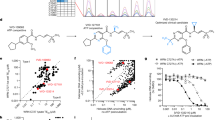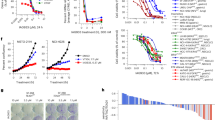Abstract
Development of resistance to cytotoxic agents is a major limitation to their clinical use. Novel compounds are synthesized with a view to develop non-cross-resistant, less toxic and more potent activity. The detection of the anti-tumour properties of the inorganic compound cisplatin stimulated a broad search for other metal-containing complexes. Titanocene dichloride was synthesized on this basis and has shown potent anti-neoplastic activity in experimental animals. We have examined the in vitro activity of titanocene dichloride in two pairs of platinum-sensitive and resistant human ovarian carcinoma cell lines, A2780/2780CP and CH1/CH1cisR, and in mutated p53- and bcl-2-transfected clones of A2780 cells. A time- and concentration-dependent anti-proliferative effect was observed in all cell lines treated with titanocene dichloride. The drug was found to significantly overcome platinum resistance in the 2780CP and the CH1 cisR cell lines and in the bcl-2 and the mutant p53 transfectants of A2780 cells. Titanocene dichloride induced a block in late S/early G2 phase of the cell cycle; however apoptotic cell death occurred from any phase of cycle. Titanium-DNA adducts were detected in A2780 cells treated with titanocene dichloride using atomic absorption spectrometry, suggesting that DNA may be a target for this drug. In agreement with this finding, p53 accumulated rapidly in drug-treated A2780 cells, indicative of a role for titanocene dichloride as a DNA-damaging agent. We have also performed studies to determine whether titanocene dichloride could demonstrate synergy with other cytotoxic agents in vitro. Isobologram analysis of cytotoxicity data obtained suggests that the combination of titanocene dichloride and 5-fluorouracil (5-FU) is synergistic. The potent in vivo anti-tumour activity of this compound, supported by the encouraging results from two phase I clinical trials, suggests that titanocene dichloride could be a promising novel chemotherapeutic agent.
This is a preview of subscription content, access via your institution
Access options
Subscribe to this journal
Receive 24 print issues and online access
$259.00 per year
only $10.79 per issue
Buy this article
- Purchase on Springer Link
- Instant access to full article PDF
Prices may be subject to local taxes which are calculated during checkout
Similar content being viewed by others
Author information
Authors and Affiliations
Rights and permissions
About this article
Cite this article
Christodoulou, C., Eliopoulos, A., Young, L. et al. Anti-proliferative activity and mechanism of action of titanocene dichloride. Br J Cancer 77, 2088–2097 (1998). https://doi.org/10.1038/bjc.1998.352
Issue Date:
DOI: https://doi.org/10.1038/bjc.1998.352
This article is cited by
-
Specific Interactions of Antitumor Metallocenes with Deoxydinucleoside Monophosphates
Journal of the American Society for Mass Spectrometry (2017)
-
Evaluation of cytotoxic activity of titanocene difluorides and determination of their mechanism of action in ovarian cancer cells
Investigational New Drugs (2015)
-
Synthesis, structural elucidation, and in vitro antiproliferative activities of mixed-ligand titanium complexes
Medicinal Chemistry Research (2014)
-
Cytotoxic activity of the titanium alkoxide (OPy)2Ti(4AP)2 against cancer colony forming cells
Investigational New Drugs (2012)
-
Binding of ansa- and non-ansa-titanocene anticancer drugs to DNA: a DFT study
Structural Chemistry (2010)



